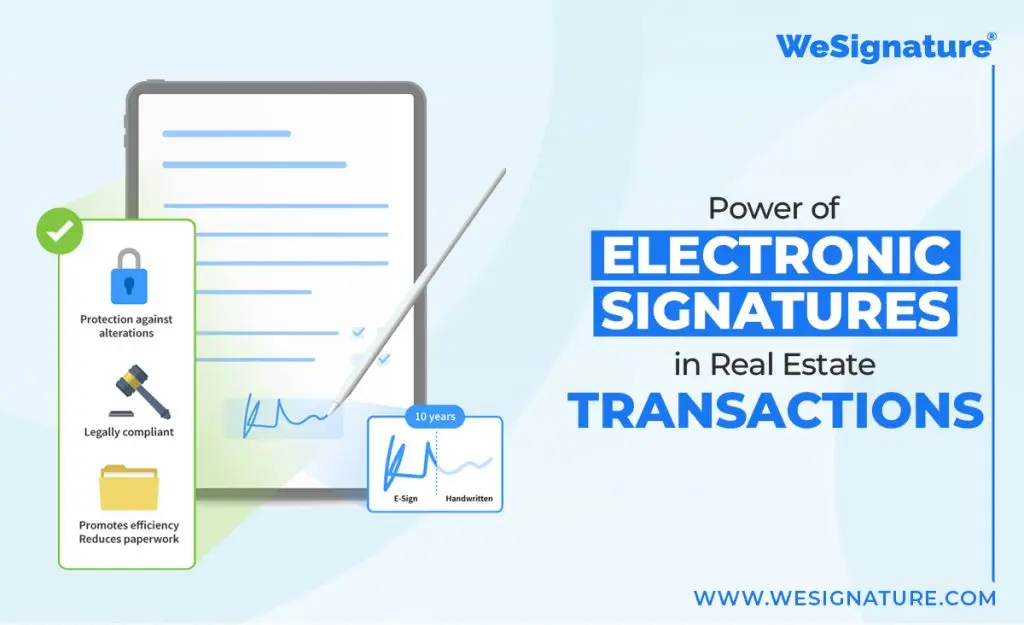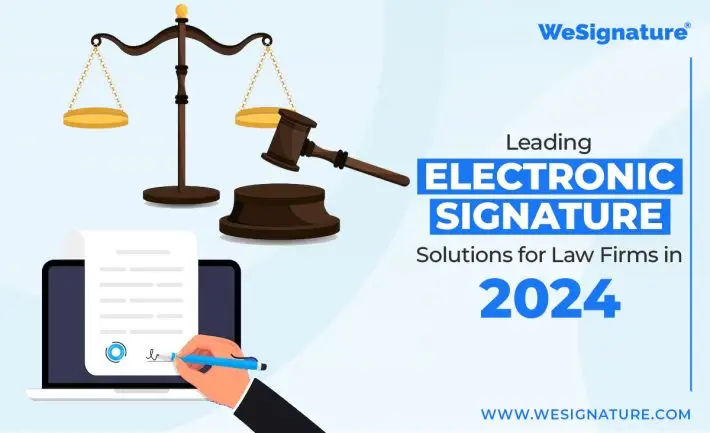How Electronic Signatures Are Revolutionizing Real Estate Transactions

Electronic Signatures in Real Estate: In the world of real estate, things move fast. Whenever you buy or sell a home, take out a loan, or enter into a contract, you have to do everything. From signing documents to transacting and finalizing deals, it all needs to be done quickly and securely.
But, is there a way to make this process smoother, faster, and safer? Electronic signature in real estate helps in these situations as it allows you to sign documents online from anywhere, anytime on your device. This saves time and eliminates the need for endless printing and scanning of multiple documents.
E-signatures can solve this problem by speeding up processes, lowering expenses, and improving data security.
What Are Electronic Signatures?
Electronic signatures, or e-signatures, are a digital version of a handwritten signature. They provide the same legal standing as a traditional signature when used correctly.
E-signatures can be created using various methods, including typing your name, drawing your signature on a touchscreen, or using a dedicated e-signature application like WeSignature. These signatures are then embedded into electronic documents, ensuring authenticity and integrity.
The Legal Status of Electronic Signatures
One of the primary concerns for many people in the real estate industry is whether electronic signatures are legally binding.
The short answer is yes. In the United States, the Electronic Signatures in Global and National Commerce (ESIGN) Act of 2000 and the Uniform Electronic Transactions Act (UETA) grant e-signatures the same legal status as handwritten ones.
This means that contracts signed electronically are legally enforceable, provided they meet certain criteria such as intent to sign, consent to do business electronically, and keeping records of the transaction.
Benefits of Electronic Signatures in Real Estate Transactions
1. Speed and Efficiency
Traditional paper-based signing processes can be time-consuming. Documents need to be printed, signed, scanned, and sent back, often causing delays. With electronic signatures, this process is reduced to a matter of minutes. Parties can sign documents online from anywhere in the world, significantly speeding up the transaction process. This increased efficiency means deals can close faster, benefiting both buyers and sellers.
2. Convenience
Electronic signatures offer unmatched convenience. No more scheduling in-person meetings just to sign a document. Clients can review and sign contracts at their convenience, whether they’re at home, at the office, or on the go. This flexibility is particularly beneficial in real estate, where clients may be located in different cities or even countries.
3. Cost Savings
Printing, mailing, and storing paper documents can be costly. Electronic signatures eliminate these expenses. There’s no need to purchase paper, ink, or postage, and there’s no need for physical storage space. Everything is stored securely online, reducing overhead costs and making document management more efficient.
4. Enhanced Security
Contrary to popular belief, electronic signatures can be more secure than traditional signatures. E-signature platforms like WeSignature use encryption and audit trails to ensure the authenticity and integrity of signed documents. This means every action taken on the document is recorded and time-stamped, providing a clear trail of who signed what and when. This level of security reduces the risk of forgery and tampering.
5. Improved Client Experience
Real estate transactions can be stressful for clients. Electronic signatures simplify the process, making it easier for clients to understand and complete the necessary paperwork.
This improved experience can lead to higher client satisfaction and repeat business. Happy clients are more likely to refer friends and family, growing your business organically.
How Electronic Signatures Work in Real Estate Transactions
1. Choosing the Right Platform
The first step in adopting electronic signatures is choosing the right platform. Look for a solution that offers robust security features, ease of use, and seamless integration with your existing workflow. WeSignature is designed specifically for real estate professionals, providing all the tools you need to manage your transactions efficiently.
2. Preparing the Documents
Once you’ve chosen a platform, the next step is to prepare your documents for signing. This involves uploading your contracts and forms to the e-signature platform. Most platforms, including WeSignature, support various file formats such as PDF, Word, and Excel. You can also create templates for frequently used documents, saving you time in the future.
3. Adding Signature Fields
After uploading your documents, you’ll need to add signature fields. These are the areas where clients will sign or initial.E-signature platforms make this easy with drag-and-drop functionality. You can also add other fields, such as dates, checkboxes, and text fields, to capture additional information.
4. Sending the Documents
With your documents prepared and signature fields added, it’s time to send them to your clients. Most e-signature platforms allow you to send documents via email, with instructions on how to sign. Clients receive a secure link to the document, which they can review and sign electronically.
5. Signing the Documents
When clients receive the document, they can sign it using their preferred method – typing, drawing, or uploading an image of their signature.
The e-signature platform will guide them through the process, ensuring all required fields are completed. Once signed, the document is automatically returned to you, with a copy sent to the client for their records.
6. Storing and Managing Documents
One of the significant advantages of electronic signatures is the ability to store and manage documents online. E-signature platforms like WeSignature provide secure storage, with easy access to your signed documents. You can organize your documents into folders, search for specific files, and share them with others as needed.
Overcoming Common Concerns About Electronic Signatures
1. Security Concerns
As mentioned earlier, electronic signatures are often more secure than traditional signatures. WeSignature uses advanced encryption and secure servers to protect your documents. Additionally, audit trails provide a clear record of who signed what and when adding an extra layer of security.
2. Client Resistance
Some clients may be hesitant to adopt electronic signatures, especially if they’re unfamiliar with the technology. It’s essential to educate them on the benefits and ease of use. Provide clear instructions and offer to walk them through the process. Many clients quickly appreciate the convenience once they try it.
3. Legal Validity
While electronic signatures are legally binding in many jurisdictions, it’s always a good idea to consult with a legal professional to ensure compliance with local laws. WeSignature complies with major e-signature regulations, including the ESIGN Act and UETA, giving you peace of mind.
Real-Life Examples of Electronic Signatures in Real Estate
1. Closing a Sale Faster
Imagine a scenario where a buyer is interested in a property but is located in a different state. Traditionally, this would involve mailing documents back and forth, potentially delaying the sale. With electronic signature, the buyer can sign the purchase agreement from their location, speeding up the process and ensuring the sale closes on time.
2. Streamlining Rental Agreements
Property managers can also benefit from electronic signatures. Rental agreements can be prepared and signed electronically, eliminating the need for tenants to visit the office. This convenience can lead to quicker lease signings and happier tenants.
3. Simplifying Document Management
Real estate agents often deal with a large volume of paperwork. Electronic signatures simplify document management, allowing agents to store and access signed documents online. This reduces the risk of lost paperwork and makes it easier to find documents when needed.
Conclusion: Embrace the Future with WeSignature
The power of electronic signatures that are revolutionizing real estate cannot be overstated. They offer speed, convenience, cost savings, enhanced security, and improved client experiences. By adopting electronic signatures, you can streamline your processes, close deals faster, and stay competitive in the real estate market.
At WeSignature, we’re committed to helping real estate professionals harness the power of electronic signatures.
Our platform is designed with your needs in mind, providing a secure, easy-to-use solution for all your e-signature needs. Whether you’re closing a sale, managing rental agreements, or handling any other real estate transaction, WeSignature is here to make the process seamless and efficient.
Embrace the future of real estate transactions with WeSignature. Sign up today and experience the difference for yourself.



